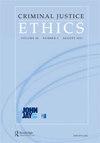Corrigendum
Q2 Social Sciences
引用次数: 0
Abstract
“Works that explore whether offenders who have been wronged by the state deserve less punishment include Bazelon, “Morality of Criminal Law”; Duff, Punishment, Communication, and Community, chap. 5; Holroyd, “Punishment and Justice”; Matravers, “ ‘Who’s Still Standing?’ ”; Tadros, “Poverty and Criminal Responsibility”; Chau, “Legitimacy of Punishment”; Delgado, “Wretched of the Earth,” 20. In a very recent paper, Christopher Lewis argues that the state’s standing to blame, and accordingly, to punish, an offender would be compromised if his disadvantage was caused by the state, even if the state has not wronged him (say, the disadvantage of the offender was justified under Rawls’ difference principle, which is assumed to be the correct principle of distributive justice): see Lewis, “Inequality,” 174–5. I want to make two points. First, even if Lewis’ argument is accepted, it cannot justify the conclusion that bad upbringing in itself affects deserved punishment because the bad upbringings of some BU offenders may not have been caused by the relevant state at all; as examples, consider an offender who was brought up terribly in one country but migrated to another country as an adult before committing his crime, or an offender who suffered abuse from his parents which the state could not have prevented even with its best efforts. (After submitting to the journal the first version of this article, which included the distinction between BU offenders and offenders who have been wronged by the state drawn at the end of the preceding paragraph, I had the benefit of reading a subsequently published paper that independently came up with a similar distinction, illustrated with examples similar to the two mentioned here. See Ewing, “Recent Work on Punishment and Criminogenic Disadvantage,” 52–53.) Second, I doubt whether Lewis’ argument is sound: while wrongful complicity in an act may, as Victor Tadros argues, compromise one’s standing to blame the principal wrongdoer for the act, it is unclear to me why causal contribution per se would compromise standing. A detailed assessment of Lewis’ argument must, however, await another occasion.”勘误表
探讨被国家冤枉的罪犯是否应该受到更少惩罚的作品包括《刑法道德》的巴泽隆;达夫,《惩罚、沟通和社区》,第5章;Holroyd,“惩罚与正义”;马特拉弗斯,“谁还站着?”;Tadros,“贫困与刑事责任”;周,“惩罚的合法性”;德尔加多,《地球的毁灭》,20。Christopher Lewis在最近的一篇论文中认为,如果罪犯的不利地位是由国家造成的,那么国家的责任和惩罚地位就会受到损害,即使国家没有冤枉他(比如说,根据罗尔斯的差异原则,罪犯的劣势是合理的,这被认为是分配正义的正确原则):参见Lewis,“不平等”,174-5。我想说两点。首先,即使Lewis的论点被接受,也无法证明不良教养本身会影响应得惩罚的结论是合理的,因为一些BU罪犯的不良教养可能根本不是由相关国家造成的;例如,一个罪犯在一个国家受到恶劣的教育,但在犯罪前成年后移民到另一个国家,或者一个罪犯受到父母的虐待,即使国家尽了最大努力也无法阻止这种虐待。(在向该杂志提交了这篇文章的第一个版本后,我阅读了随后发表的一篇论文,该论文独立地提出了类似的区别,并举例说明了与这里提到的两个类似的例子第二,我怀疑Lewis的论点是否合理:虽然正如Victor Tadros所说,一项行为中的不当共谋可能会损害一个人将该行为归咎于主要不法行为人的地位,但我不清楚为什么因果关系本身会损害地位。然而,对刘易斯论点的详细评估必须等待另一个时机。”
本文章由计算机程序翻译,如有差异,请以英文原文为准。
求助全文
约1分钟内获得全文
求助全文

 求助内容:
求助内容: 应助结果提醒方式:
应助结果提醒方式:


